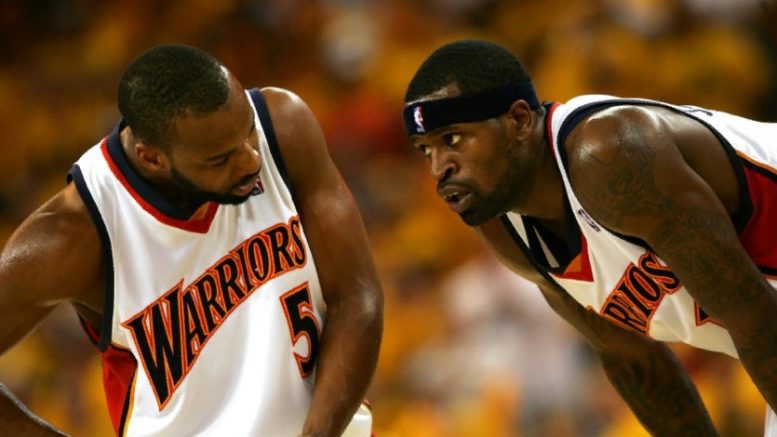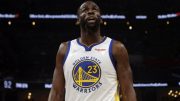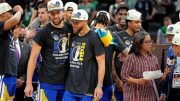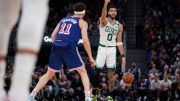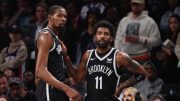Stephen Jackson was chastised throughout his career for his outspoken views. He’s become a thought leader for the NBA community in his retirement.
Stephen Jackson was public enemy number one in the mid-2000s, before the NBA became the neoliberal corporate ally it is today.
Jackson’s work as a “boots-on-the-ground” fighter for racial justice and police accountability in 2020 put pressure on the NBA to have a sudden “Spring Awakening” on African-American problems that it had long ignored, denied, and criticized. This is an odd contradiction.
During the outbreak, Jackson used his influence as co-creator and co-host of Showtime’s All The Smoke podcast to rally the public around the police killings of young African Americans and people of color.
After the murder of his buddy, George Floyd, whom he dubbed “twin” because of their similar features, Jackson utilized his popularity to form a nationwide network to organize protests.
The league hastened to burnish its image as a corporation that elevated black voices and supported its players’ freedom to protest, immediately imitating Jackson’s organic efforts.
It is ironic, given that the league did everything it could under David Stern and before him to prevent players from banding together over political causes, including suspending them when they decided to peacefully protest the national anthem.
Those who watched Jackson play at his prime in the 2000s aren’t surprised that he would galvanize Americans of all races and backgrounds to unify against police brutality. Jackson was a beloved teammate who helped turn around multiple lottery-bound franchises into postseason hopefuls.
He was the heart and soul of a competing Indiana Pacers squad (2004-2007) and the sixth man on the championship-winning San Antonio Spurs team in 2003. He also helped turn around the fortunes of the Charlotte Bobcats (2009-2011) and Golden State Warriors (2007-2009).
Stephen Jackson wasn’t intended to be here in the first place
The Port Arthur, Texas native was a state champion in high school and was recently honored in the Texas UIL state tournament. Jackson had to grind his way through minor levels as a late second-round choice before establishing himself as a great two-way player who improved every team he joined.
Jackson attended Butler County Community College but did not play basketball there, instead relying on his street cred as an outstanding baller in Phoenix Suns casual games. That was enough to persuade Suns general manager Danny Ainge to take a chance on him in the 1997 NBA Draft.
Even so, it would take three more years of proving himself in the CBA as well as internationally in Australia, Venezuela, and the Dominican Republic before he won a position on an NBA roster.
Jackson was more than just a 3-and-D winger throughout his 14-year career, scoring more than 20 points per game three times and averaging 15 points per game.
Jackson is well known for being one of the key instigators of the 2004 Malice at the Palace fight between his Indiana Pacers and the Detroit Pistons. But, as we saw in the 2021 documentary Untold: Malice at the Palace, many fans were just as much to blame as the league, which didn’t do enough to protect the arena or have a plan in place for aggressive fans.
Even though Jackson did not provoke or start the brawl, he was suspended for 30 games and his reputation was tarnished as a result of the incident. The incident began when a Pistons fan threw a cup of beer at Pacer teammate Ron Artest, who then charged into the stands. While watching after his teammate, Jackson followed him into the chaos to bring him back.
Jackson got his honor back without help from the league or a public relations campaign. He did this by continuing to be the same kind of teammate he had always been, even after Artest went into the stands.
The Pacers’ chances of winning a championship were hindered by Jackson’s and others’ suspensions. When he was traded to Golden State, Jackson found a team of kindred exiles to bond with and play for.
Jackson was a vocal leader for that historic team, which became the first No. 8 seed to defeat a No. 1 seed in a seven-game series.A few weeks after being crowned MVP of that season, Jackson signed future Hall of Famer Dirk Nowitzki.
Jackson upset the huge German by getting inside his personal space and psyche, and it was a masterclass in front and footwork. It took years for Nowitzki to recover from the humiliation of being shut down by a smaller defense.
When Jackson joined in 2009, the Charlotte Bobcats were the worst team in the NBA. But, once he arrived, he wasted no time in improving the fortunes of the young franchise, leading the Bobcats to their first playoff appearance. He also tied for 12th place in the league MVP vote in 2010, with Chris Bosh, Joe Johnson, and Chauncey Billups.
Jackson improved the teams he joined almost everywhere he went. He could always be counted on to give his all for his comrades. He was protecting the best player on the other squad.
On him needing the ball in a pinch Jackson played in an era when the media, the league, and the fans lacked empathy for him as a complete player and person. They were always emphasizing the negative.
They were mostly concerned with his upbringing. He was judged based on how he dressed and spoke. And when he went into the stands to defend a teammate, he was demonized without respect for the circumstances.
Jackson is a champion, the perfect teammate, a dawg, and someone who has put in a lot of effort to improve things.
He’s made mistakes, but he’s attempted to accept responsibility for them. He should be remembered for everything he accomplished on and off the court, as someone who valued the game and never shied away from a battle, even when it was unpopular.

